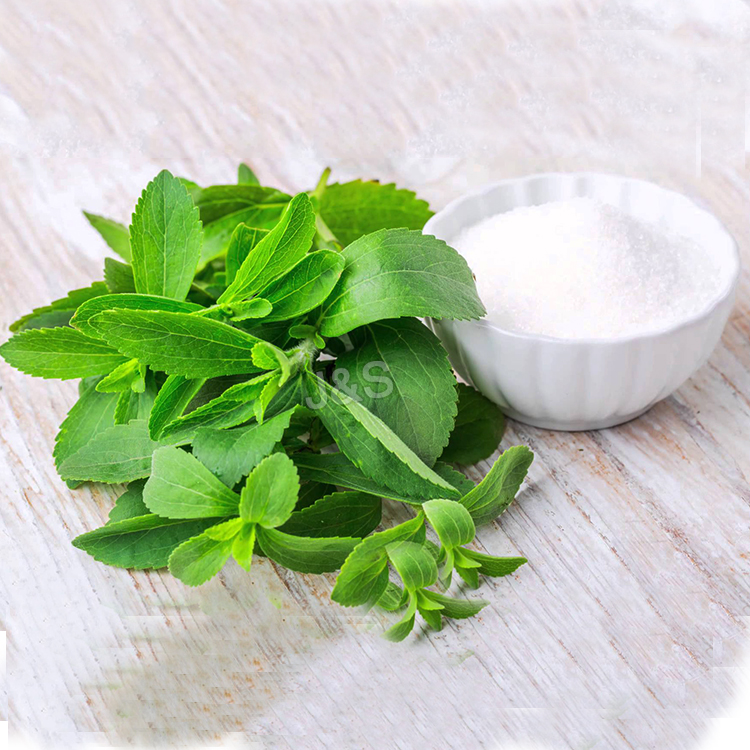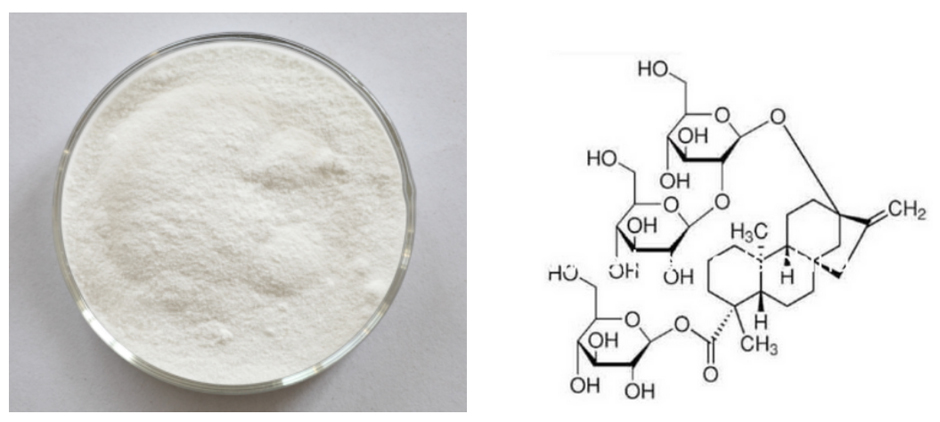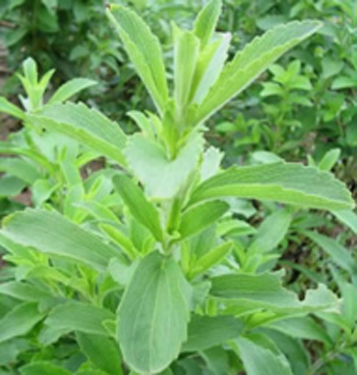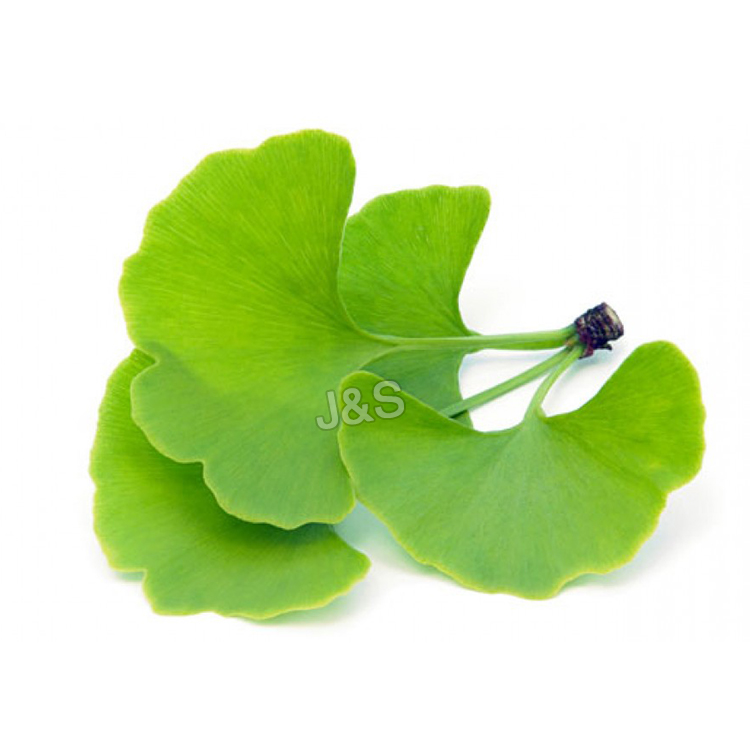New Arrival China Stevia Extract Factory in Ghana
New Arrival China Stevia Extract Factory in Ghana Detail:
[Latin Name] Stevia rebaudiana
[Plant Source]from China
[Specifications] 1.Stevia Extract Powder (Steviosides)
Total Steviol Glycosides 80%, 90%, 95%
2. Rebaudioside-A
Rebaudioside-A 40%, 60%, 80%, 90%, 95%, 98%
3. Stevioside 90%
One monomer in Steviol Glycosides
[Appearance] Fine white powder
Plant Part Used:Leaf
[Particle size] 80 Mesh
[Loss on drying] ≤5.0%
[Heavy Metal] ≤10PPM
[Shelf life] 24 Months
[Package] Packed in paper-drums and two plastic-bags inside.
[Net weight] 25kgs/drum
Stevia Extract
[Characteristics]
Stevia sugar features high sweetness and low calorie and its sweetness is 200 350 times of that of cane sugar but its calorie is only 1/300 of that of cane sugar.
The component of stevia extract that gives it its sweetness is a mixture of various steviol glycosides. The components of sweetness in stevia leaves are stevioside, rebaudioside A, C, D, E and dulcoside A. Rebaudioside C, D, E and dulcoside A are small in quantity. The principal components are stevioside and rebaudioside A.
The quality of stevioside and rebaudiosideA is better than those of other components, which are commercially extracted and used in various applications.
The steviol glycosides present in stevia extract are referred to as “steviosides” or ¡°stevia extract¡±. Among these “steviosides”, the most common is Stevioside followed by RebaudiosideA. The Stevioside has a slight and pleasant herbal taste and the Rebaudioside-A has no herbal taste.
Although Rebaudioside C and dulcoside A are small in quantity in stevia extract, they are the major components giving bitter aftertaste.
[Function]
A large number of pharmaceutical tests have proved that stevia sugar has no side effects, carcinogens, and is safe for eating.
Compared with cane sugar, it can save 70% of the cost. With pure white color, pleasing taste and no peculiar smell, Stevia sugar is a new sugar source with broad perspective for development. Stevia rebaudianum sugar is the natural low hotsweet agent mostly similar to the flavor of cane sugar, approved to be used by State Ministry of Health and Ministry of Light Industry.
It is the third natural succedaneum of cane sugar and beet sugar with development and health care value, extracted from the leaves of the herbal vegetable of the composite family-stevia rebaudianum.
Product detail pictures:

Related Product Guide:
Our intention should be to fulfill our consumers by offering golden provider, superior price and superior quality for New Arrival China Stevia Extract Factory in Ghana , The product will supply to all over the world, such as: Grenada, Lahore, Bulgaria, We only supply quality products and we believe this is the only way to keep business continue. We can supply custom service too such as Logo, custom size, or custom products etc that can according to customer's requirement.
Xylitol Reduces Plaque,
Fights tooth decay & cavities,
Remineralizes Tooth Enamel,
Fights and prevents ear infections,
Is safe for Diabetics and Hypoglycemics,
Has a low Glycemic Index of 7,
Has 40% less calories than sugar,
Inhibits bacteria,
Reduces yeast growth and candida albicans,
Enhances protective factors in saliva,
Minimal effect on blood glucose levels,
Reduces sugar contact time on teeth…
Many studies done in Europe and North America have clinically proven the dental advantages of xylitol but how does it work? Here is a brief explanation: Streptococcus mutans bacteria. (S. mutans) is the primary cause of tooth decay. S. mutans is a common bacteria that lives in the plaque that is continually building up on our teeth. This bacteria ferments the sugar and carbohydrates from our diets. A by-product of the fermentation is an acid that erodes away the protective tooth enamel and forms cavities. However, it has been discovered that S. mutans are not able to digest xylitol, so fermentation and acid production is stopped. As the bacteria were exposed to more xylitol over time, their numbers decreased and they became less aggressive. So people who use more xylitol in place of sugar decrease their oral bacteria levels and experience far less plaque, tooth decay and cavities. Since these bacteria are no longer able to live in the mouth, they get washed down the throat with saliva and die a miserable death in the flood of stomach enzymes and acids. It has been clinically proven that xylitol aids in the remineralization of tooth enamel. The tooth enamel is the hard layer that protects the teeth from harmful substances like sugar and acids.
Other studies have clinically proven that eight grams of daily, oral xylitol use reduces the occurrence of Acute Otitis Media (AOM) or ear infections by 40%. Also, the unborn baby also benefits from mother’s xylitol consumption. Still other researchers at the University of Minnesota, using rabbits have found a correlation between poor dental health and high blood pressure and coronary clotting which leads to heart attacks. Results still must be confirmed in humans. Researchers at the State University of New York-Buffalo in a new study found people with poor dental health had almost twice the risk of emphysema and other lung diseases. The worse the dental health of the person, the greater the risk. The germs and bacteria in the saliva travels through the throat to the lining of the lungs making it more susceptible to infection with common respiratory germs.
The herb, STEVIA rebaudiana, has been used for centuries by the Guarani Indians of Paraguay, who had several names for the plant, several of which are Kaa’-he-E, Caa’-ehe, or Ca-a-yupe- all. referring to the sweet leaf or honey leaf. It is commonly known in South America as yerba dulce meaning sweet herb. The Guarani used stevia nutritionally and medicinally. The plant came to the attention of the rest of the world when South American naturalist, Bertoni, “discovered” the plant in the late 1800′s. After his report,. the herb became widely used by herbalists in Paraguay. Stevia’s most obvious and notable characteristic is its sweet taste. However, the sweet taste is not due to carbohydrate-based molecules, but to several non-caloric molecules called glycosides. Individuals who cannot tolerate sugar or other sweeteners can use stevia. The first glycoside molecule was isolated from stevia in 1931 by two French chemists named Bridel and Lavieille and called stevioside. During WW II, sugar shortages prompted England to begin investigation of stevia for use as a sweetener. Cultivation began under the direction of the Royal Botanical Gardens at Kew, but the project ‘was abandoned in the aftermath of the war. Japan began cultivating stevia in hothouses in the 1950′s. By the 1970′s, Japan started using stevia commercially and today, they are the biggest users of the extract, which has captured 50% of Japan’s sweetener industry. Other aspects of stevia are capturing people’s attention. The herb is sold in some South American countries to aid diabetics and hypoglycemics. Research has shown that a whole leaf concentrate has a regulating effect on the pancreas and helps stabilize blood sugar levels. Stevia is therefore useful to people with diabetes, hypoglycemia, and Candidiasis. Other traditional uses of stevia are: lowers elevated blood pressure (hypertension), digestive aid that also reduces gas and stomach acidity, and for obesity. The herb acts as general tonic which increases energy levels and mental acuity. Stevia has been shown to inhibit the growth and reproduction of bacteria that cause gum disease and tooth decay, making it an excellent addition to tooth pastes and mouthwashes. Many people have reported improvement in their oral health after adding stevia concentrate to their tooth paste and using it, diluted in water, as a daily mouthwash.
We are long-term partners, there is no disappointment every time, we hope to maintain this friendship later!






